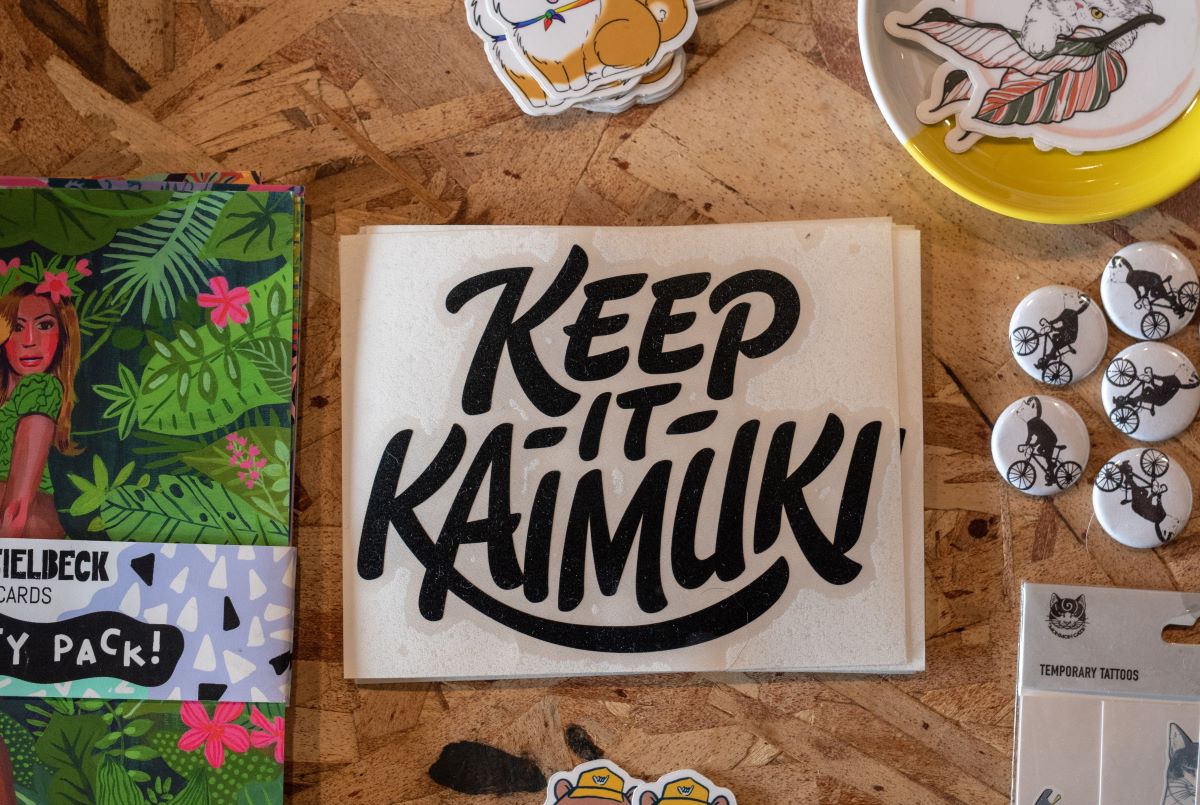As large-scale development creeps into Honolulu’s residential neighborhoods, can Kaimukī retain its current charms? Local shopkeepers hope so.
Sometimes it feels like Kaimukī is frozen in time. Dry and sunny, the neighborhood extends from the entrance to Pālolo Valley to Diamond Head just east of Waikīkī. There are no fancy gated mansions like in Kāhala or Kaka‘ako-esque high-rise buildings in sight. Instead, homes and establishments date back to the early 20th century, a period of charming Hawai‘i plantation-style architecture.
The pulse of Kaimukī starts at its heart: Wai‘alae Avenue. Beginning at Kapahulu Avenue and tapering off near Kahala Mall, Wai‘alae runs right through Kaimukī. Lined with local businesses, the avenue doesn’t feel crowded or hurried, but rather inviting and leisurely.
“It’s always been a really cool neighborhood, I’ve always loved it, I’ve always thought that this is home,” said Liz Schwartz, owner of Coffee Talk, a bustling coffee shop on the corner of Wai‘alae Avenue and 12th Avenue. “It’s a real neighborhood where real people live and work.”

From her veteran post on Wai‘alae, Schwartz, who is a Kaimukī resident, has noted a recent revitalization of the neighborhood.
“I feel like there’s new energy breathing into Kaimukī, and it’s a great feeling,” she said. “Everyone is so into what they’re doing, and they don’t want to be in a mall. They’re very proud of where they are.”
Over the past few decades, some establishments have left, like JJ French Pastry and Bistro; some have opened, like Kaimuki Superette; and others, like the Crack Seed Store, have remained strong.
The Public Pet, Kaimuki Superette, Brew’d, and Golden Hawaii Barbershop have all arrived on the avenue since 2014. Although these specialty businesses are undeniably Instagrammable, they’re also quintessentially, and proudly, local. Stocked with locally made brands or products, these businesses want to be in Kaimukī not for tourists or foot traffic, but because their owners love the neighborhood, and Hawai‘i.
“Kaimukī is still a family neighborhood,” said Grant Fukuda, owner of Golden Hawaii Barbershop. Fukuda grew up near Wai‘alae Avenue in Pālolo and remembers his childhood days noshing on saimin at Tanouye’s and catching the latest surf films at now-defunct Queen’s Theater. “We love that on a Friday night you can see three generations of a family going out for a mellow dinner,” he said. “We wanted a neighborhood barbershop for the local community, where young students to our Pālolo grandpas could feel comfortable. Our shop pays homage to the old Hawai‘i we love, so to be in a neighborhood that still has elements of old Hawai‘i was important to us.”
At the same time, that old Hawai‘i is fading. Real estate in the islands is more precious than ever. Already, large-scale property development has made its way to residential O‘ahu neighborhoods like Kailua and Kāhala. There is a buzz around the endangerment of Kaimukī’s own down-to-earth, local vibe.
“Two words: monster homes,” said Jordan Lee, co-owner of The Public Pet. Like a contagious disease, O‘ahu has seen a rapid influx of gigantic, square-shaped houses containing as many as 20 bedrooms springing up at alarming rates in neighborhoods like Kalihi, Kapahulu, and Kaimukī. Sticking out like boxy sore thumbs, these unsightly houses potentially raise property taxes.
“There is absolutely a fear of gentrification,” Fukuda said. “Once the original buildings have been torn down, the families pushed out, the neighborhood will never be the same.” When he and co-owner Jennifer Fukuda were designing the barbershop, they were nervous about bringing unwanted attention to the neighborhood. But they wanted to give friends and the local community something different and pay homage to their Hawai‘i upbringing, culture, and history.

Fukuda isn’t alone in this sentiment. He joins a growing group of local businesses and folks who have pure love for the neighborhood and have created a force as unique as Kaimukī out of it. You may know this force as Keep It Kaimuki, a movement Lee and Matthew Guevara started on Instagram in 2017. “The inspiration for Keep It Kaimuki was to really pump up the neighborhood and celebrate this new wave of small-business owners establishing themselves,” he said. “I saw what was happening in neighborhoods like Chinatown, Kailua, and Kaka‘ako, each with its own vibe. I knew that Kaimukī was unique with its laid-back energy, charming details, and urban connections.”
Now you see the phrase on T-shirts, tote bags, and stickers in storefront windows. Keep It Kaimuki organizes neighborhood events—such as street-art painting and Small Business Saturdays—to bring exposure to local businesses, strengthening their ties to the community. Many of these events take place on Wai‘alae Avenue, which Lee calls “the drumbeat of the Kaimukī area.”
Business owners like Schwartz love Keep It Kaimuki for bringing the neighborhood together. “It’s so inclusive, and no one is threatened by anyone else,” she said. “Everyone is like, ‘We’re all a part of it, we’re as supportive as we can be of our neighbors.’”
The warm spirit of Wai‘alae Avenue is palpable. You can feel it in the restaurants and stores at almost any time of day. There’s the cozy patio of Brew’d, which is lit by charming string lights, and right across the street is Mud Hen Water, with its romantic, bistro vibes. On the opposite end of Wai‘alae is Coffee Talk, where you can feel the buzzing energy radiate off the tall ceilings, and Pipeline Bakeshop and Creamery, a local malasada and dessert joint washed in a baby-blue hue. Patronizing Wai‘alae is more than just running a few errands, it’s an experience only a neighborhood that truly is proud of itself can offer.





